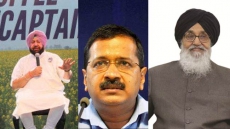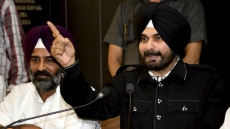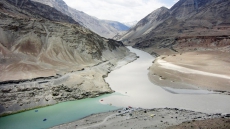The Union government on Friday told the Supreme Court that 'triple talaq', 'nikaah halaal' and polygamy as practised by the Muslims in India were not "integral to the practices of Islam or essential religious practices."
"The fact that Muslim countries where Islam is the state religion have undergone extensive reforms goes to establish that the practise in question cannot be regarded as integral to the practices of Islam or essential religious practices," argued the government in an affidavit filed on Friday.
Referring to the changes in the personal law that have already taken place in Islamic countries, the government has cited the instances of changes in marriage laws in Iran, Egypt, Indonesia, Turkey, Tunisia, Morocco, Afghanistan, Bangladesh and Pakistan.
"It is noteworthy that even theocratic states have undergone reforms in this area of the law and therefore in a secular republic like India, there is no reason to deny women the right available under the constitution," it said in its response to top court's September 5 order asking it spell out its position on the right of Muslim women in matrimonial matters relating to divorce and maintenance, including triple talaq.
An apex court bench of Justice Anil R. Dave and Justice Adarsh Kumar Goel had by their October 16, 2015 order, issued notice to Attorney General Mukul Rohatgi and the National Legal Service Authority as it directed the separate listing of a PIL addressing the question of the rights of Muslim women.

The government said that the question of triple talaq, where husbands can summarily divorce their wives by pronouncing the word 'talaq' thrice, 'nikaah halaal' under which a divorced couple cannot remarry unless the woman marries again and becomes single again through divorce or death of the second husband, and polygamy needs to be considered in the light of the "principle of non-discrimination, dignity and equality".
It said that the question is whether triple talaq and polygamy was compatible with contemporary constitutional morality and the principle of gender equality enshrined in the constitution.
Saying that the right of women to human dignity, social esteem and self-worth are important facets of right to life, the government said that the gender justice is important and any practice by which women are left socially and financially or emotionally vulnerable or subject to whims and caprice of men folk is against gender justice.

It said that the constitutional right should be given to all irrespective of religion and pointed out that India was a signatory to international covenants which guarantees right to equality to women.
Personal laws must be examined in light of gender justice and dignity of women and those inconsistent with fundamental rights are void.
"The fundamental question for determination is whether in a secular democracy, religion can be reason to deny equal status and dignity, available to women under the constitution," the government said in its response affidavit.




